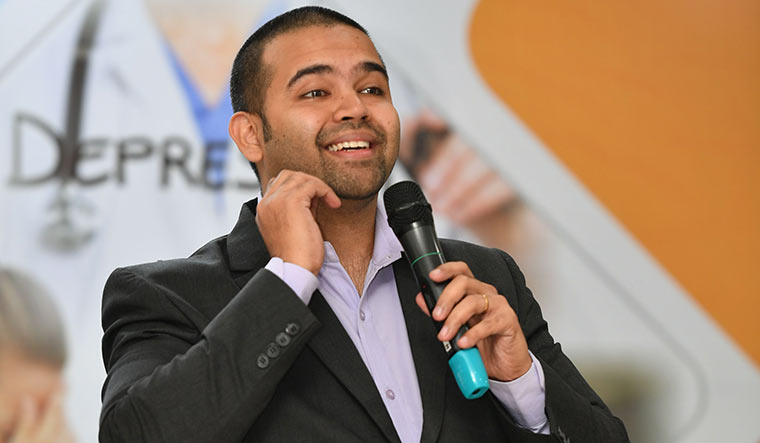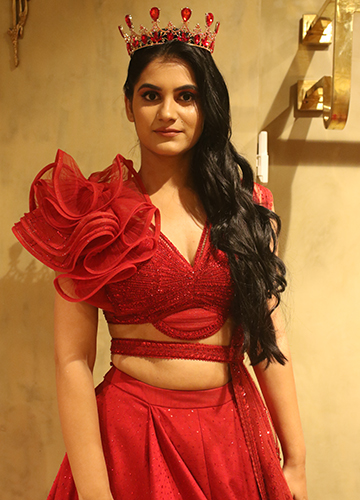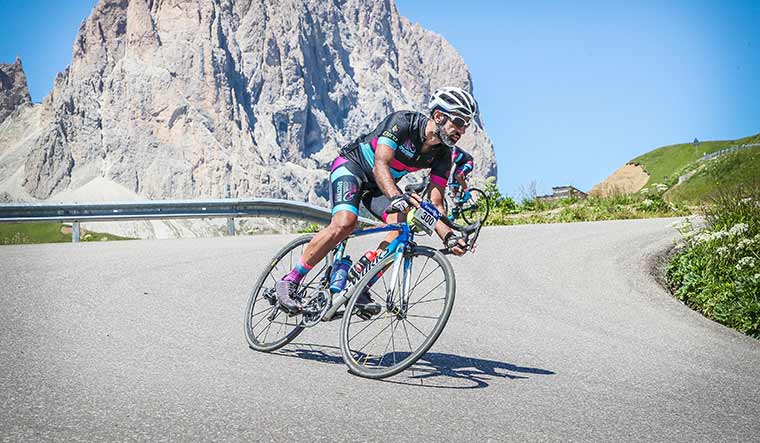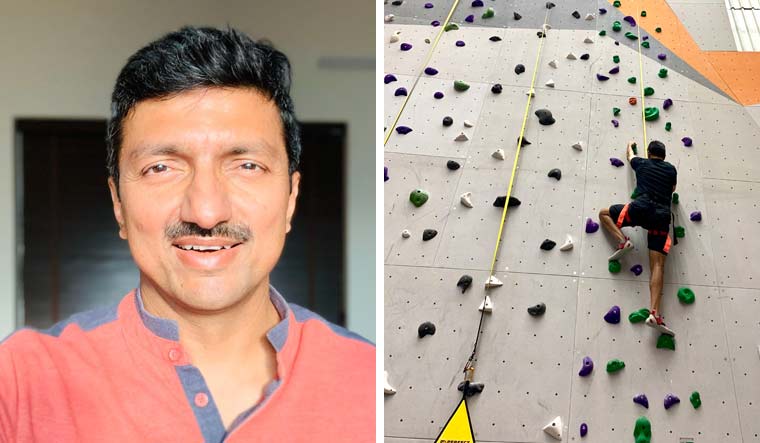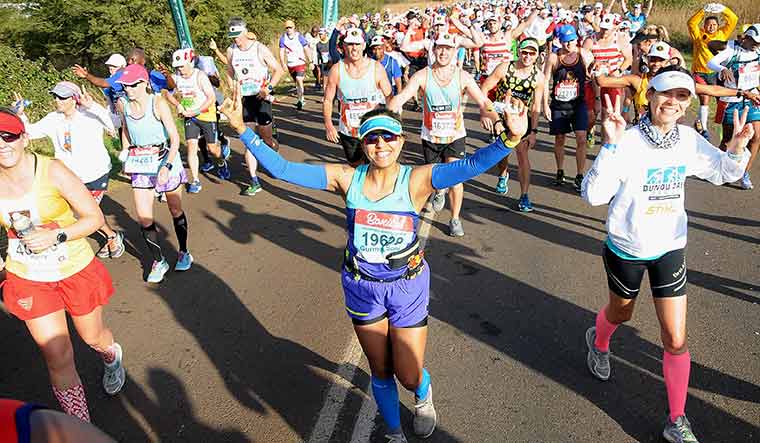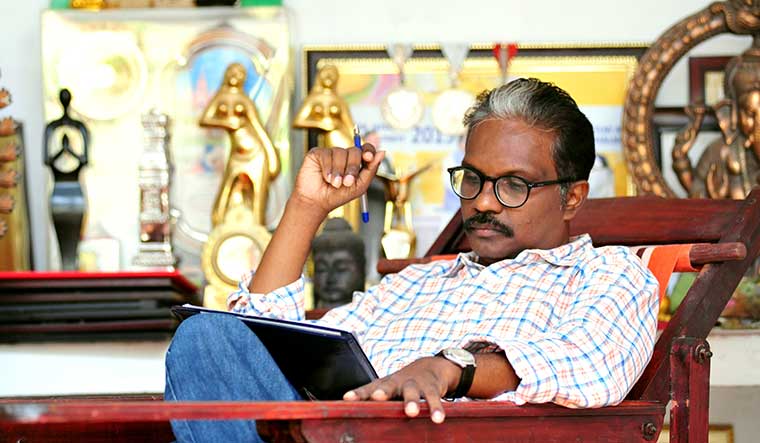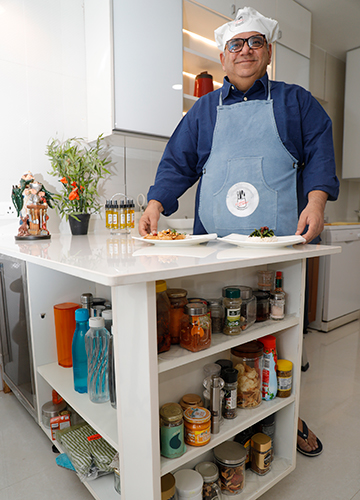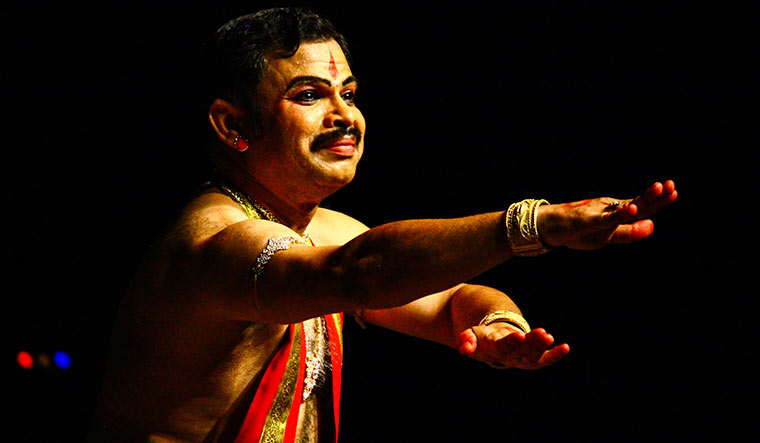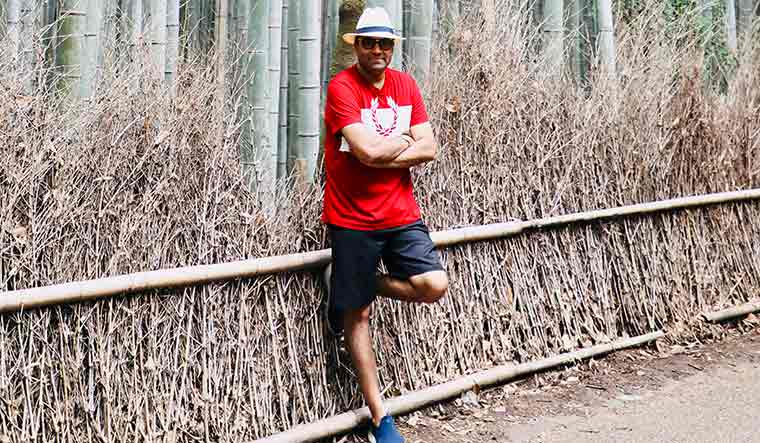‘ITHAKA’, A POEM BY Constantine P. Cavafy, offers a panacea for modern ills. The Greek poet tells us not to hurry the journey of life and reminds us how important it is to pause, to satiate our senses and gain knowledge and experience. The journey, he says, is more important than the destination.
I had something of an epiphany while reading the poem. Caught up in our everyday lives, we tend to forget what we had been and what our fondest childhood dreams were. But some people manage to reconnect with their passions, despite the challenges life throws at them. The doctors featured in this package belong to that group.
Take, for instance, Dr Shobhit Chawla from Lucknow. An eye surgeon, he cooks like a man possessed once he gets back home. Chawla loves to cook Kashmiri Pandit cuisine—Kashmiri kofta, dum aloo, lal paneer, phirni and rogan josh. “I find cooking meditative,” he says. “Avoiding eating what I have cooked is a great exercise in self restraint!”
Dr Jagdish Chaturvedi, a nose and sinus surgeon at Fortis Hospital, Bengaluru, finds fulfillment in standup comedy, which not only breaks the monotony in his life but also serves as an alternate source of income, making him less dependent on his primary profession. Having a hobby can be truly rewarding, says Chaturvedi. “I get a lot of patients from the audience. Sometimes people come to me after the show to take a selfie and then they pull out a CT scan and ask for consultation,” he says. “One patient who came and consulted me after the show got operated on a few days later for sinus. My shows are cheaper than my consultation fee. So, it is a win-win situation for both the parties.”
Rock climbing is more than just a hobby for Dr Sanjay Dhawan, director and head of ophthalmology, Max Healthcare, Delhi and Gurugram. “While profession is like fuel to the engine, passion is like oil,” says Dhawan, who thoroughly enjoys his lizard-like climbs. “Hobbies are required for smooth running. Else there will be friction, heat and breakdown.”
Pursuing a hobby is a way for doctors to maintain their sanity. Doctors are often consumed by their work and deal with stressful life-and-death situations. “A hobby can help them lead a balanced and emotionally healthier life,” says Dr Shyam Bhat, psychiatrist-physician and head at Mindfit, who used to do standup comedy earlier.
However, a hobby could add to a doctor’s stress, if he is not good at managing time. Dr Arvind Bhateja, a cycling globetrotter and neurosurgeon based in Bengaluru, has had to make a lot of sacrifices to follow his heart. “The biggest sacrifice I make is on my social life. And then you have to wake up early to get your workout done while the rest of your colleagues are fast asleep. Maybe you will have to give up on eating sweets during the festivals. Your training demands that,’’ he rues. However, Bhateja confesses that his hobby means the world to him.
It is observed that doctors who actively pursue hobbies are more happy overall and are more productive at work. Here, a few doctors tell us how they balance their passions with their profession.
JOKE'S ON YOU
A man walks in with his mother who is unwell, looks at me, and says, “Ready kar ke dey.” I look at him and ask, “Should I home deliver her to you once she is ready?’’
Dr Jagdish Chaturvedi’s comedy revolves around themes he is angry about.
“I am basically an angry man. [Doing] standup helps me de-stress and convert my anger into comedy,” he confesses. His jokes on Bengaluru’s parking and traffic problems and doctor-patient violence are hugely popular.
His childhood experiences—“I was a problem child. I would get into trouble a lot.”—too, made their way into his comedy, especially in his ‘F for Failure’ standup set. “There was no dearth of ideas while writing the one-hour comedy script,’’ says Chaturvedi. He did the show in cities across the country and the proceeds from it went to NIMHANS for a campaign on raising awareness on depression.
The inner child in him still asks annoying questions. “I never understood the concept of studying important questions before the exams,” says the 35-year-old. “I mean if there are important questions, why are they teaching us unimportant things?” Our restaurants are as weird as our classrooms, he says. “Restaurants treat your home food as 'outside food'. They write it in capital letters—OUTSIDE FOOD NOT ALLOWED.”
Chaturvedi juggles the demands of a challenging career and an all-consuming passion with ease. “Surgeries are done during the day and standup comedy happens over the weekends or at night. So, there is not usually a schedule collision,” he says. “It helps both the domains. A lot of people see my comedy and then come to me for treatment because they think I am a friendly person.” But managing family and standup is more challenging, he says. Most of the time, though, they fall in place and help each other.
His eponymous YouTube channel features skits and cartoon sketches, besides his standup acts, and has more than 1,20,000 subscribers. He is now working on a web series—Starting Troubles—to be launched in November.
Doctors have an amazing sense of humour, says Chaturvedi. To encourage doctors to do comedy, he has started a movement called #DoctorsDoComedy. “We are providing a platform for medical students and doctors to do comedy after undergoing a one-day workshop,” he explains. “So far, we have done these shows in Bengaluru, Hyderabad, Mumbai and Delhi, where we have had ten medical professionals try out comedy. All these shows were housefull.”
CROWNING GLORY
Dr Deepanjali Pathak Mundada believes in the power of dreams. Everybody should have a dream and make it come through, she says.
Originally from Meerut, Mundada drew inspiration from Rhonda Byrne’s The Secret while preparing for the Mrs India Pride of Nation contest, organised by Glamour Gurgaon. “I would visualise myself winning the crown, and that filled my mind with positivity. Our thoughts can impact the whole life we are experiencing,’’ says the 33-year-old consultant diabetologist based in Mumbai. She was the second runner-up in the contest, and won the Miss Beautiful Smile subtitle.
Around 7,000 women took part in the Mrs India Pride of Nation auditions in 2019. Mundada got selected from the Mumbai region. Being a beauty queen is not as easy as it seems, she says. The finalists had to attend grooming sessions. “We had a workshop on catwalk, where we were taught how to walk in six-inch high heels—something I was not used to,” she recalls. “Then there were sessions on etiquette and personality development, besides the ones on how to do your makeup and hair. Some of these sessions would go on till midnight.”
What does it take to be a good model? “I think first and foremost is confidence,” she says. “It is not just about beauty. You should have confidence in yourself and be open to new things.”
Mundada considers the Mrs India contest a platform to interact with a large number of people and create awareness on health issues. “I am doing campaigns on breast cancer awareness,” she says. “I want to emphasise on how women can remain healthy. When it comes to diseases like cancer, early diagnosis and treatment are crucial. Women often tend to put themselves at the end of their to-do lists and end up paying a huge price for it.” Her breast cancer campaign comes from a personal experience—her mother, who, she says, is her biggest inspiration, had breast cancer. Early diagnosis and timely treatment coupled with her willpower and positive attitude helped her fight the disease.
Every doctor should have a hobby, says Mundada. “I always wanted to do more apart from my professional life. We are not born just to live our routine lives,” she says. “A doctor spends about 12-13 years of her life studying hard. We are so much into academics that we don’t get to celebrate festivals or attend family functions. So it is extremely important that we pause and do something for ourselves amid our hectic schedules.’’
RIDING HIGH
Cycling on Maui island in Hawaii is an almost surreal experience, says Dr Arvind Bhateja, neurosurgeon and spine surgeon at Sita Bhateja Speciality Hospital, Bengaluru. “There is a 60km mountain climb that starts at a beach and goes to the top of Haleakala, a dormant volcano, which is 10,000ft above sea level,” says the avid cyclist.
Bhateja, who has cycled up Pass Stelvio, one of the highest mountain passes in the Alps, believes that cycling is the best way to get to know a new country. “When you are cycling, you tend to choose roads that have less traffic. In European countries, typically those would be country roads. They are off the highway and through villages,” he says. “When you stop for a meal or for refreshment, you actually interact with the locals and you get to see the real countryside. It is clearly the best way to see a country.”
Bhateja, 50, has thus explored Hawaii, Italy, Singapore, Indonesia and Thailand on his S Works cycle. His fitness journey—mostly working out in the gym—began in 2003. He wanted to run the half marathon, but couldn’t as his knees had started troubling him. That is when he took to cycling. “I went and test rode a bike in 2009 and there was no looking back after that,’’ he recalls. He has also taken part in cycling races like the Giro delle Dolomiti in Italy. He took part in the 2016 edition of the Tour of Nilgiris after an injury and yet was able to finish first in the veterans category.
Bhateja says one can cycle at any age. In international events, it is not uncommon to see people who are in their 50s or 60s. “You see a lot of women who are really fit and strong in these events. That has been a real eye-opener for me,’’ he says.
Cycling abroad has its own set of challenges. “Exporting the bike is a fairly big challenge in itself,” he says. “Sometimes, the bike has technical issues once it lands at the destination. Sometimes you forget to pack something or some accessories are missing and you end up looking for help at the last minute.’’ A crash abroad is one of the worst things that can happen. One has to be prepared for all these eventualities, says Bhateja.
Usually, when people hear about India, the first thing they ask Bhateja is how he manages to cycle in all that traffic. One thing Bhateja loves about Italy is the respect they give to cyclists. “You’ll always find a long trail of cars behind you—they won’t overtake you unless the opposite side is clear and it is safe for them to overtake,” he says.
ROCK STAR
As a child, Dr Sanjay Dhawan, 57, was fond of hiking and climbing mountains. But little did he know that he would continue to enjoy it in his adulthood. “A few years ago, I came across a book by Mohit Oberoi that details all rock climbing spots in Delhi NCR. That really helped,’’ recalls Dhawan, who specialises in cataract and refractive surgery.
Rock climbing is the best sport for those who love the outdoors, mountains and climbing. However, it is no child’s play, says Dhawan. “To be able to do rock climbing, one needs to be physically fit. If you are not fit, you won’t enjoy it and may even end up with injuries. So, overall fitness is required,” he explains.
Endurance and strength training workouts go a long way in terms of increasing muscle mass, strengthening bones and preventing injuries. Running and cycling, too, help Dhawan stay fit. “I would recommend yoga and stretches also for those who are into rock climbing. You need to have strong upper limbs and hands to be able to hold on to the rocks,’’ says Dhawan, who is a regular at Climb Central Delhi. Rock climbing helps burn calories as well. “With one hour of climbing, you can get rid of enough calories to enjoy your food,” he says.
So how does he deal with the fear of heights while climbing? “My fears are all controlled by logic,” he says. However, the first time he attempted a free climb—climbing without any harness or rope—he got stuck in the middle of the pitch for a good amount of time and almost panicked. The instructor had to come up to rescue him, or he could have fallen and broken his bones as there was no pad below. Dhawan learnt his lesson—one shouldn’t be reckless or foolhardy when it comes to rock climbing.
Dhawan, who is also into photography, music, writing and books, says that profession and passion should go on hand in hand to keep a person lively. Almost every time he has gone climbing or hiking, he has either held an eye camp or provided informal medical service to the villagers en route.
READY FOR THE LONG RUN
Running happened by chance, says Dr Gurmeet Soni Bhalla, a paediatrician and allergist who works with RxDx Clinic in Bengaluru. “Since I was a fitness enthusiast, someone asked me to sign up for Sunfeast 10k marathon in 2009. I did reluctantly, and found myself on the podium. And, I was hooked,’’ she recalls. Since travelling is another passion, Bhalla tries to run races wherever she goes for vacations with her family.
This year, Bhalla, 50, became a member of the Seven Continents Club, which enrols runners who have run the full marathon on all the continents. The Athens marathon was her first full marathon. Another memorable experience was the Prague Marathon, thanks to which she saw the beautiful city on the run. The Inca trail in Peru, she says, is rightly known to be the hardest marathon. Running in rarefied air at 17,000ft in the Khardung-La Challenge in Ladakh was an ethereal experience, she says. And, the Antarctica Marathon was both challenging and exotic. “While in the Antarctica, we got caught in a blizzard and it took seven days for a special cargo plane to fly us out of there,” she recalls, adding that she bonded with 50 runners from 13 countries while stranded on the continent.
With not many women participating in races, she says she finds herself on the podium often. “It is really motivating, even though I run for the joy of running,” says Bhalla, who is originally from Jammu and Kashmir. She has started enjoying ultra marathons, too. They bring you closer to nature and also test your endurance, she says.
Running can be time-consuming and hence Bhalla tries to manage her time well. “I start my day early, say, 5am, get done with my run by 7am, finish household chores and then head to work,” she says. “It does take discipline and motivation to stay on track. I have to cut down on social commitments to adhere to my training schedule.”
Bhalla follows a 16-week programme to train for a full marathon or an ultra marathon. It comprises four days a week of running, besides strength training twice a week. “I am mindful of what I eat so I don’t have to make too many adjustments except to increase my protein intake when my running mileage increases,’’ she says.
Her husband runs, too, and they take vacations with the family around the marathon schedule. “My teenage children respect my passion for running and help me with chores,’’ she says.
For Bhalla, running has been a gratifying and enriching journey. According to her, the perks of running include fitness, friendships, travel experiences and a chance to give back to society by mentoring and sometimes coaching friends.
REEL TIME
Being a doctor has helped him be a complete filmmaker.
Dr Biju's film Birds with Large Wings depicts how endosulfan, a synthetic pesticide, wreaked havoc in Kasargod district in Kerala, leaving people crippled for life. Having a solid grasp on the effects of pesticide on humans, Biju could delve deep into the issue.
For Biju, films are a catalyst for social change. His movies like Kaadu Pookkunna Neram, Perariyathavar and Veyil Marangal deal with the lives of the marginalised. They draw heavily on his experiences as a doctor. “As a government doctor, I often interact with people belonging to the lower strata of the society. A large part of my work involves improving the health of the tribal communities,’’ says Biju, who was at the forefront of the rescue and relief operations during the tsunami and last year's floods in Kerala.
Biju’s favourite locations include the Himalayas, Sikkim, Ladakh and Andaman and Nicobar Islands. “Once while shooting in Ladakh, someone in the crew had altitude sickness. I gave him medication and he could continue with the shoot,” says Biju, currently a district medical officer at Pathanamthitta. A homoeopath, he always carries his medicine pouch, especially while shooting in remote places.
A self-taught filmmaker, Biju, 48, has become a name to reckon with in Indian cinema. He started his journey with Saira, which was screened at the Cannes Film Festival in 2007 as the opening film in the world cinema section. A three-time national award winner, Biju has also won international awards like the Golden Goblet for Outstanding Artistic Achievement at the Shanghai International Film Fest in 2019 for Veyil Marangal. His movies have been screened at various international film fests, like the ones in Montreal, Tehran, Cairo, Telluride and New York. He was also part of the 2015 Oscar selection jury for the best foreign language film from India and was on India's National Film Award jury in 2012.
Sound of Silence was his first non-Malayalam film—it was in Pahari, Tibetan and Hindi. The success of Sound of Silence encouraged him to do Painting Life, a film in English.
Though not a regular at cinema halls, he still manages to watch over a hundred movies every year. “I take part in all major film fests in different countries. I watch around 150 movies a year,’’ says the director and scriptwriter who is a huge fan of Satyajit Ray and Majid Majidi.
EYE ON FOOD
Dr Shobhit Chawla loves everything about food, from its tantalising aroma to its mesmerising taste. “I even like to talk about food and recipes and to visit supermarkets and gourmet stores with their fascinating range of ingredients,’’ says the 57-year-old medical director and cofounder of Prakash Netra Kendra, Lucknow. Culinary shows that combine cooking with travel are his favourite. “They broaden your outlook about food and cuisine, expose you to interesting ingredients,’’ he says.
Chawla, who specialises in diseases of the retina and the vitreous body, has donned the chef’s hat thrice, that too in five-star hotels on invitation. “Once, it was an evening buffet as part of a home-cooked food festival. I did a full dinner buffet, including two desserts,” he says. “I chose to do a Kashmiri Pandit [cuisine] for the buffet. It was a sellout.” He has twice taken part in contests on innovative cooking, one of which he won.
Chawla does a lot of Italian food, like gourmet pastas. A perfectionist, he makes his own pasta. “It is a bit cumbersome but I don’t believe in buying the packets. I use fresh ingredient,” he says. His friends vouch for his carbonara. His other specials include the Thai steamed fish, paneer dishes made in Kashmiri Pandit style and Awadhi dishes. He loves experimenting with traditional recipes, hunting them down from old Lucknow families and giving them a twist. “I do my own innovations like mango salsa with roasted chicken and drunken prawns with cooked peaches. I am now enjoying innovating a lot of healthy salads, adding flavour and punch to healthy dishes,” he says.
Chawla has had his share of culinary failures. “Once I put fish in the oven to steam and my guests arrived and I forgot about it. It was overdone, charred and leathery and I had to quickly cook akuri for them, as the main course was not edible,’’ he recalls.
Medicine and cooking, it seems, are in his genes. “My mother was an excellent cook and a baker, besides being a gynaecologist,” he says. “Our neighbour Manglik, an English professor, and my mom would do a lot of interesting western dishes together. These influences initiated me into cooking.’’
So who cooks at home? Usually, it is his wife, who emphasises on healthy food. Twice a week, Chawla takes control of the kitchen to ladle up some comfort food.
HEALING MOVES
Dr Kanishka Das, 53, fell in love with dance while in middle school. “My elder sister, Tapaswini, was a disciple of Guru Kelucharan Mohapatra. I would accompany her to the dance class and soon found myself fascinated by the moves and the mudras,’’ says Das, professor and head of paediatric and neonatal surgery at the All India Institute of Medical Sciences, Bhubaneswar.
His parents were aghast when they came to know of his newfound interest. Back then, male dancers were not that common. Das, however, refused to give up his passion; soon, they gave in.
He started his formal training in Bharatnatyam while he was studying medicine. He says dance helped him excel in medicine. “I felt refreshed to imbibe the difficult medical texts after a dance session, notwithstanding the physical exhaustion,” he says. He practised and performed the most while doing his masters in surgery at Post Graduate Institute of Medical Education and Research, Chandigarh. While he was a faculty at St John's Medical College, Bengaluru, he would squeeze in time for dance practice either early in the morning or late at night. The practice would be particularly intense before performances, and he continued to practice both Odissi and Bharatnatyam.
His most memorable performances have been at the Yadavindra Gardens, Pinjore (Odissi), in front of the sanctum of the Jagannath Temple, Chandigarh and on a winter evening at the Odissi centre of Guru Gangadhar Pradhan at Konark (both Bharatanatyam).
Looking back, he says the journey has been tough but gratifying. “I have carried the art form with me and it has kept me sane through mad times,’’ says Das. He says that being a dancer endears him to the patient, shatters his demigod image and cements the trust between him and the patient in intangible ways. “On discovery, my patients are pleasantly surprised, often amazed, that the knife-wielding hands can bring forth a flowering mudra,” he says. They appreciate that there is a soft side to their apparently strict healer and they open up further in communication. These are things central to the healing profession.”
WALK WAY
Take a leisurely walk in a forest, and immerse yourself in its sights, sounds and scents.
The Japanese believe that just being in nature and connecting with it will help keep diseases at bay. Shinrin-yoku, the Japanese practice of forest bathing, is now gaining popularity.
Dr Rohit Shetty, vice chairman, Narayana Nethralaya, Bengaluru, was introduced to shinrin-yoku when he visited Japan ten years ago. A co-passenger, who worked as an environmental science professor at a university in Tokyo, got Shetty interested in forest bathing. Forest Bathing: How Trees Can Help You Find Health and Happiness, written by Dr Qing Li, a professor at Nippon Medical School in Tokyo, gave him more insights into the practice.
“Shinrin-yoku means taking the atmosphere of the forest with you,” explains Shetty, 43. “All you have to do is walk for an hour quietly in a forest. Breathe mindfully. This will help boost immunity and bring down your stress hormone levels.’’
Shinrin-yoku is considered as the foundation of preventive health care in Japanese medicine, and is part of Japan’s national public health programme. Connecting with nature can work wonders for children with attention-deficit/hyperactivity disorder, says Shetty. “It improves intuition and cognition,” he says. Forest bathing has prompted numerous scientific studies that throw light on the health benefits of getting back to nature, which include reduced blood pressure and improved concentration and memory. Phytoncides, a chemical released by trees and plants, can boost the immune system.
One of the most beautiful forest walks Shetty had was during his trip to Kyoto in Japan. “Practising forest bathing in the bamboo forests of Arashiyama in Kyoto had a huge influence on my thought processes. I have done forest bathing in Machu Picchu in South America, too, where there is a trek that leads up to the ruins.’’ While in Karnataka, he practises it twice or thrice a month. “We have an estate at Shiroor in Udupi that has a beautiful forest area. It is perfect for forest bathing,” he says.
Shinrin-yoku is becoming increasingly popular in countries like England. Kate Middleton, the Duchess of Cambridge, is a huge fan of nature therapy. “Shinrin-yoku is not trekking; it is not jogging either,” says Shetty. “It is very quiet walking with mindful breathing.”



